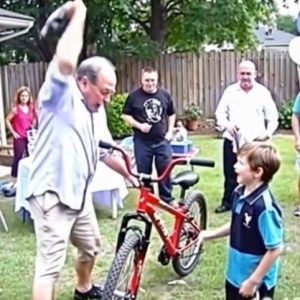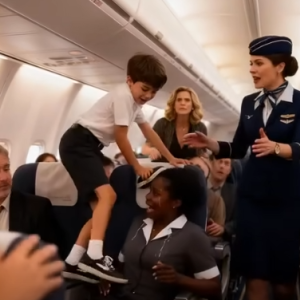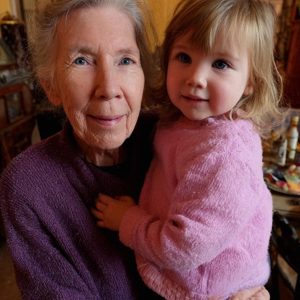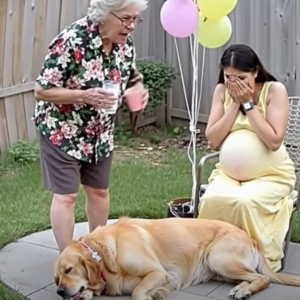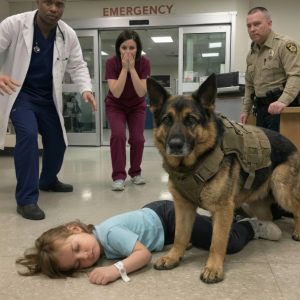It happened a few years back in the wide-open heartland of Iowa, where endless fields stretch toward the horizon and the rhythm of life is measured by the hum of tractors and the turning of the seasons. For weeks afterward, the story dominated local news stations and then spread like wildfire across the country. Some called it miraculous. Others shook their heads and dismissed it as unbelievable. And plenty more argued about what it really said about us, about the human condition. Were the creatures we so often call “animals” really the ones without humanity? Or was walking upright and speaking in full sentences enough to be called human—when a heart could still choose cruelty?
The whole ordeal began in early spring, the kind of spring where the soil is finally free from frost but the air still carries winter’s bite. Farmers across the county were out in their fields, tractors dragging harrows behind them to aerate the earth before fertilizer went down. The smell of thawing dirt lingered, mingled with faint traces of damp leaves and new growth.
One of those farmers was Jack. He was in his forties, a sturdy man with sun-browned skin and hands so calloused they felt more like leather than flesh. He was a man who spoke little to strangers—neighbors sometimes joked that getting words out of him was harder than splitting dry hickory—but at home, with his family, he was a different soul entirely.
He had three children of his own: two lively little girls who adored climbing into his lap at the end of the day, and a toddler son whose giggles could melt the hardest day’s work into nothing but joy. His wife often teased him, saying, “You only come alive when the kids are around.” But she knew better. She knew that beneath his quiet exterior, Jack’s love for his family ran deep, steady, and immovable—like the roots of an old oak tree.
That morning, Jack had drawn the lot for the far plot, the one bordering the woods. He didn’t mind—it meant fewer interruptions, fewer tractors roaring nearby. Just him, his John Deere, and the open sky. After hitching the harrow, he lit a cigarette and leaned against the tractor, savoring a rare moment of stillness.
The land smelled of thaw and promise. The birds were louder than they had been in months, the sun was pale but insistent, and Jack thought—as he often did—that this was the good life. No cubicles, no traffic lights, no buzzing phones. Just sky, dirt, and silence.
He climbed back into the cab and got to work, rumbling slowly across the soil. The machine spat exhaust, churning and breaking the ground in neat rows. Then, as he neared a wedge of clearing that ran up against the treeline, he froze.
At first, he thought it was the wind carrying strange notes through the woods. But then it came again—long, low howls rolling across the field. Wolves.
Jack frowned. Wolves were supposed to be rare here. He leaned out of the cab, scanning the treeline. The sound grew louder, sharper, more insistent, like a chorus of grief.
And then he saw them.
A dozen gray wolves, standing in the clearing. Their fur shimmered silver in the early sun. They weren’t hunting, weren’t feasting, weren’t fighting. They were circling something strange—something wooden and box-like. A battered crate.
Jack killed the engine and grabbed the crowbar from the cab, bracing himself. His pulse hammered in his ears. Wolves weren’t supposed to behave like this. And yet, when he climbed down and stepped toward them, they didn’t charge. They didn’t bare teeth. A few actually backed away, their golden eyes fixed on him, as though relieved he had finally noticed what they had been trying to show.
One wolf padded a few steps toward the trees, glanced back at him almost deliberately, and then disappeared into the forest. Slowly, the others followed, until only paw prints and silence remained.
Jack stood frozen, staring at the crate. The grass around it was trampled. The boards were scarred with deep claw marks, as if the wolves had been trying to rip it open. He stepped closer, heart pounding. And then—he heard it.
A cry. Thin. Fragile. Human.
His breath caught. His hands shook as he wedged the crowbar into the seam and pried. Nails groaned, boards split, and with a sharp crack the crate came apart. What he saw inside drove the air from his lungs.
Two babies. Tiny. Barely six months old. Twins, swaddled in filthy rags, their cheeks blotchy from cold. Their little fists trembled. Their eyes squeezed shut with weak, pitiful cries.
